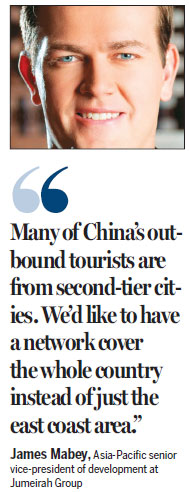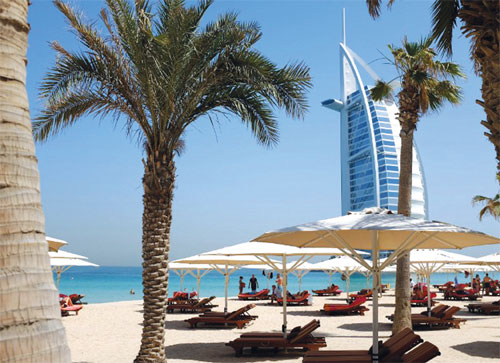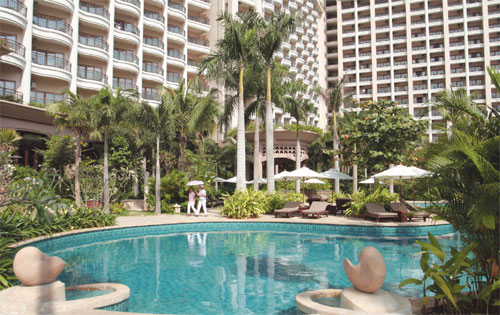China dream set to come true as Dubai luxury hotel brand banks on travel bug
Updated: 2015-07-15 08:50
By Emma Dai in Hong Kong(HK Edition)
|
|||||||||
Jumeirah Group, the Dubai-based luxury hotel brand, has its sights set on China for the coming years, as it believes the ever-growing income of mainland residents as well as their enthusiasm for outbound travel presents a gold mine for the high-end hospitality industry.
"China is already one of our top five markets. In the next few years, the market will continue to grow and become even stronger. I estimate it would at least rank among the top three for us," said James Mabey, Asia-Pacific senior vice-president of development at Jumeirah Group.
The luxurious hotel and resort operator, known for the iconic Burj Al Arab Hotel on the Persian Gulf, has seen mainland tourists become one of the growth engines in Dubai and other holiday destinations.
According to Mabey, the group recorded 17 percent annual growth of revenue in 2014 from mainland guests, who made up 6 percent of its customers worldwide. In comparison, the growth rate of its overall room revenue was 3.1 percent last year, according to the financial report of Dubai Holding, parent company of Jumeirah Group.
"At the Burj Al Arab Hotel, 27 percent of visitors last year were from China. Sometimes, during the Chinese New Year, for instance, the hotel is almost full of Chinese," Mabey said.
"Our brand recognition is strong among Chinese. It's not just for the Burj Al Arab Hotel, but for all of our hotels in the Middle East and even Europe as well. Within the country, we hope to provide the same type of experience as we do in Dubai," he said.
As a latecomer to the mainland hospitality sector, Jumeirah Group opened its first Chinese hotel in Shanghai in 2011. But more are on the way. Of the 18 new hotels Jumeirah is building worldwide, eight are located in China.
That includes two hotels in Nanjing and Guangzhou, expected to open their doors next year, while the other resorts are located in Sanya, Haikou, Wuhan, Qiandaohu, Hangzhou and Macao SAR.
"Currently, we have 23 hotels worldwide. As soon as we cut the ribbon for the new hotels, China will become the second-largest market for us in terms of portfolio size, following only Dubai," Mabey said.
Although some may consider the slowing mainland GDP growth and the long-lasting anti-extravagance campaigns targeting excessive spending of public funds as set to pose strong headwinds for luxury brands as well as the high-end hotel business on the mainland, Mabey said these factors are a "non-concern" for Jumeirah.
"Even more important is the growth in disposable incomes," Mabey pointed out. "Chinese are getting higher salaries, which enables them to travel more frequently. Their spending on luxury items is also going to increase. Regardless of what campaign is launched, Chinese will continue to dine out, have family gatherings. The middle class is pursuing a more sophisticated lifestyle and appreciating high quality of services. Rather than extravagant, I believe our customers are discerning."
And that confidence is more than justified. Data from the China National Tourism Administration show the number of Chinese mainland outbound tourists reached 61.9 million in the first half this year, while in 2014, as many as 107 million mainland tourists traveled aboard, almost eight times the number recorded in 2001.
Hong Kong-based brokerage CLSA estimates that by 2020, the number of mainland outbound tourists will reach 200 million. It also says tourist spending is expected to triple from 500 billion yuan ($80.5 billion) a year in 2013 to some 1.4 trillion yuan in the next five years.
According to a Boston Consulting Group research report published in June, mainland middle class, upper middle class and affluent households will contribute $1.7 trillion, or more than half, to the estimated $3.2 trillion of urban consumption this year.
The number of consumers belonging to the middle class and above will rise from 81 million today to 142 million by 2020, who are by then anticipated to account for as much as $3.8 trillion of the $5.6 trillion projected total urban consumption, the report indicated.
However, with competition already fierce in the hotel industry, Mabey said the key is to "stay different" and maintain quality of service as expansion is carried on.
"We focus on creating a different experience and making sure our hotels are culturally connected with their local environment," he said.
"The difference comes from interior decor, the promotions and programs we launch and the services we provide. In every city, our hotels are different."
He emphasized that, in order to secure quality of service, Jumeirah Group has trained about 200 out of its 640 Chinese employees at the Emirates Academy of Hospitality Management in Dubai, a university offering both undergraduate and postgraduate programs.
"We can secure visas for large groups of Chinese to be trained in Dubai, which is a very international city. This is critical because they can see various kinds of hotels and have exposure to all kinds of culture as well," Mabey said.
Compared with first-tier mainland cities, Mabey said it is the future of second-tier cities that the group is investing in.
"Many of China's outbound tourists are from second-tier cities. We'd like to have a network cover the whole country instead of just the east coast area," he said. "The growth of China will continue to progress rapidly in the future. Many second-tier locations today are already bigger than most cities in the US. What's more, we are looking at the mid-term potential of these cities - what the market will look like in five years or 10 years."
The company is also interested in Hong Kong, but the going has been less than easy. "We have talked with many local partners in the past seven years, but we haven't figured out who to work with yet. You need to have the right partner and a good location. It's very difficult. For us, waiting is better than having a product that's not perfect. Hopefully we will find the right one soon."

|
A view of Burj Al Arab Hotel, operated by Jumeirah Group, in Dubai. Shrugging off concerns over the adverse effect of slowing economic growth and anti-graft campaigns on the luxury industry on the Chinese mainland, Jumeirah Group bets big on the area. With a plan to build up to eight new resorts across China, Jumeirah is expected to open two hotels in Nanjing and Guangzhou next year. Asia News Photo |
|
Chinese mainland middle class, upper middle class and affluent households will contribute $1.7 trillion, or more than half, to the estimated $3.2 trillion of urban consumption this year, according to a Boston Consulting Group research report. Asia News Photo |
(HK Edition 07/15/2015 page8)

